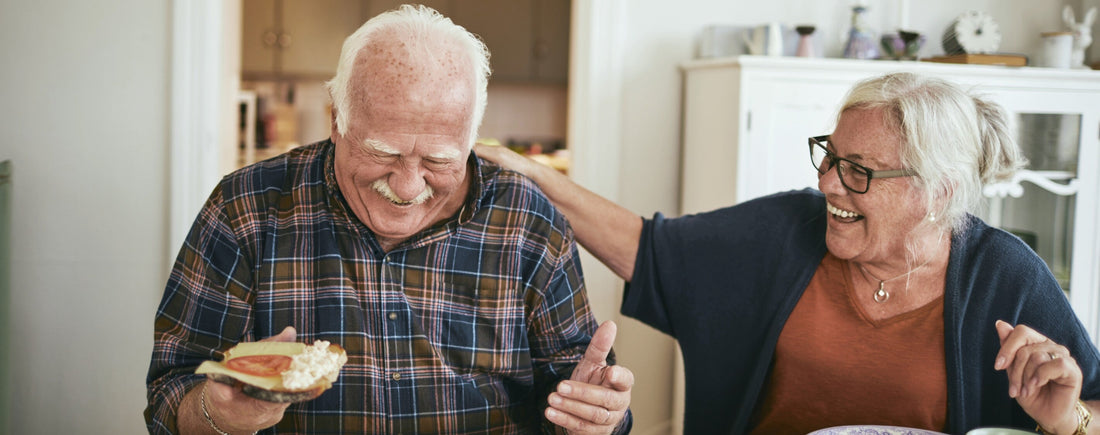In my part one of this guide, I discussed some of the lessons I learned about caring for myself while caring for my grandfather. Here is the second half of the guide, highlighting five more self-care tips.
This is especially relevant when in a caregiver role. Be relentless in the pursuit of happiness even if it’s only in small amounts here and there. Find ways to buoy up your spirit, and this will not only benefit you but the one you are caring for.
The emotions of my grandfather and I were deeply intertwined. When I was happy, he responded likewise and smiled more. When I was angry, he became anxious. Find joy in the little things and invite humor in as much as possible. The feeling after a good laugh is priceless. Here are some examples of uplifting activities:
One of the most important tools in my toolkit was the book, Seven Spiritual Law of Success by Deepak Chopra. The powerful readings and practical exercises brought me inspiration I never expected.
Tip: Find a mantra or quote that holds meaning for you and post it somewhere where you can see it such as the bathroom mirror. A fun idea is to pull a card each day from an inspiration card deck to help motivate you.
Tip: A good idea is to maintain a list of ways people can help out so that when asked you can refer to it. Take into consideration the person and what they are good at or enjoy doing, such as cooking, cleaning, or doing errands.
For a while, yoga videos were how I exercised. I would park my grandfather in his wheelchair close by so he could see me, and I would press play and start my practice. He would watch me and chuckle to himself, probably thinking I was crazy.
Schedule some time whether it’s 5 minutes or an hour to exercise. It’s rare you will exercise and think, “Well, that was a waste of time.” Give it a try!
Tip: Don’t limit yourself to traditional forms of exercise. There are many “caregiver friendly” forms of exercise such as:
Make it something you enjoy doing!
It’s so easy to get caught up in the stress of caregiving and forget to enjoy the precious moments. While you’re at it, give as many hugs as possible as this is healing for both the giver and the receiver. If hugging is not an option, then a simple touch on the shoulder or hand is extremely soothing.
Tip: Keep a journal of happy moments or funny stories. Use your phone to record them if necessary until you can write them down later.
With the understanding that everyone’s situation is different, my hope is that you, the caregiver, find some comfort and guidance in reading this guide. Continue to stay the course and remember to find the joy and laughter in life as much as possible. Most of all, take care of you!
Give yourself the gift of six days dedicated to relaxation, detoxification, and healing at the Chopra Whole Health Retreat at CIVANA Wellness Resort & Spa.
Engage in Uplifting Activities
There is a quote by Walt Whitman that states, “Keep your face toward the sunshine – and shadows will fall behind you.”This is especially relevant when in a caregiver role. Be relentless in the pursuit of happiness even if it’s only in small amounts here and there. Find ways to buoy up your spirit, and this will not only benefit you but the one you are caring for.
The emotions of my grandfather and I were deeply intertwined. When I was happy, he responded likewise and smiled more. When I was angry, he became anxious. Find joy in the little things and invite humor in as much as possible. The feeling after a good laugh is priceless. Here are some examples of uplifting activities:
- Read an inspiring book
- Take a warm bath
- Laugh with friends
- Listen to uplifting music
- Take a nap
- Go on a walk
- Practice gratitude
- Get a massage
One of the most important tools in my toolkit was the book, Seven Spiritual Law of Success by Deepak Chopra. The powerful readings and practical exercises brought me inspiration I never expected.
Tip: Find a mantra or quote that holds meaning for you and post it somewhere where you can see it such as the bathroom mirror. A fun idea is to pull a card each day from an inspiration card deck to help motivate you.
Ask for Help
One of the hardest things for a caregiver to do is to ask for help. To others, it may appear you have everything under control. However, the complete opposite may be true. Consider what is holding you back from asking: fear of rejection, the belief of being able to handle it all, not wanting to burden others--does this sound familiar? Whatever the reasons are, out of love and respect for yourself, please reach out. This is where effective communication comes into practice and can help empower you to speak up.Tip: A good idea is to maintain a list of ways people can help out so that when asked you can refer to it. Take into consideration the person and what they are good at or enjoy doing, such as cooking, cleaning, or doing errands.
Don’t Forget to Exercise
Exercise is good for you, and yet this is usually the last thing you may think about when caught up in the busyness of caregiving. Before you decide to ignore this recommendation, keep in mind that the benefits for caregivers specifically extends to the following:- Reduced tension
- Increased energy
- Increased feelings of positivity
- Less irritability
- Increased creative problem-solving skills
For a while, yoga videos were how I exercised. I would park my grandfather in his wheelchair close by so he could see me, and I would press play and start my practice. He would watch me and chuckle to himself, probably thinking I was crazy.
Schedule some time whether it’s 5 minutes or an hour to exercise. It’s rare you will exercise and think, “Well, that was a waste of time.” Give it a try!
Tip: Don’t limit yourself to traditional forms of exercise. There are many “caregiver friendly” forms of exercise such as:
- Dancing to music in your living room
- Chair yoga
- Tai Chi
- Exercise DVDs
- Online exercise programs
- Walking and enjoying nature.
Make it something you enjoy doing!
Utilize Your Resources
It literally takes a village to provide care to a loved one or anyone in need of caregiving. Don’t wait until you feel overwhelmed to seek help. From the very beginning, start to do research on what resources are available to support you in the role of caregiver. The approval process for some programs can take a while, so start filling applications and get a jumpstart. Also, become an expert on what insurance is able to cover. To help get you started, here are some resources:- For veterans, check out the U.S. Department of Veteran’s Affairs website
- Get in contact with a social worker through your local hospital
- Rosalynn Carter Institute for Caregiving
- Inquire at your local church for services they provide
- Contact the local senior center for a list of services
Notice the Little Moments and Treasure Them
When caring for a loved one, you will remember certain moments forever. When is the last time you stopped and simply enjoyed the moment? During quiet times, observe the person you are caring for. Notice the way they smile, their little mannerisms, the way they tell jokes, how picky they are with food, or how they sing at the top of their lungs during church.It’s so easy to get caught up in the stress of caregiving and forget to enjoy the precious moments. While you’re at it, give as many hugs as possible as this is healing for both the giver and the receiver. If hugging is not an option, then a simple touch on the shoulder or hand is extremely soothing.
Tip: Keep a journal of happy moments or funny stories. Use your phone to record them if necessary until you can write them down later.
With the understanding that everyone’s situation is different, my hope is that you, the caregiver, find some comfort and guidance in reading this guide. Continue to stay the course and remember to find the joy and laughter in life as much as possible. Most of all, take care of you!
Give yourself the gift of six days dedicated to relaxation, detoxification, and healing at the Chopra Whole Health Retreat at CIVANA Wellness Resort & Spa.






















